
Learning to speak Spanish in Spain
Megan Colborne
Posted: April 22, 2020
Arriving in Spain, I knew I would encounter the Spanish language. But I could never predict the effects that this language immersion would have on me.
“Hola, como estas?”
Um, como es-what?!
Panic.
I glanced over my shoulder, frantically searching for the nearest bin to hide from the chaos, panic and confusion rushing through my head in that Barcelona airport.
“Hello, how are you?” the same voice echoed, in English this time.
I returned my panic-stricken face to the petite woman behind the counter and smiled awkwardly.
“Uh sorry, you know, that I don’t speak Spanish.”
This very quickly became my most used sentence in Spain, when I wasn’t in the company of my host family who would translate what – to me – sounded completely foreign.
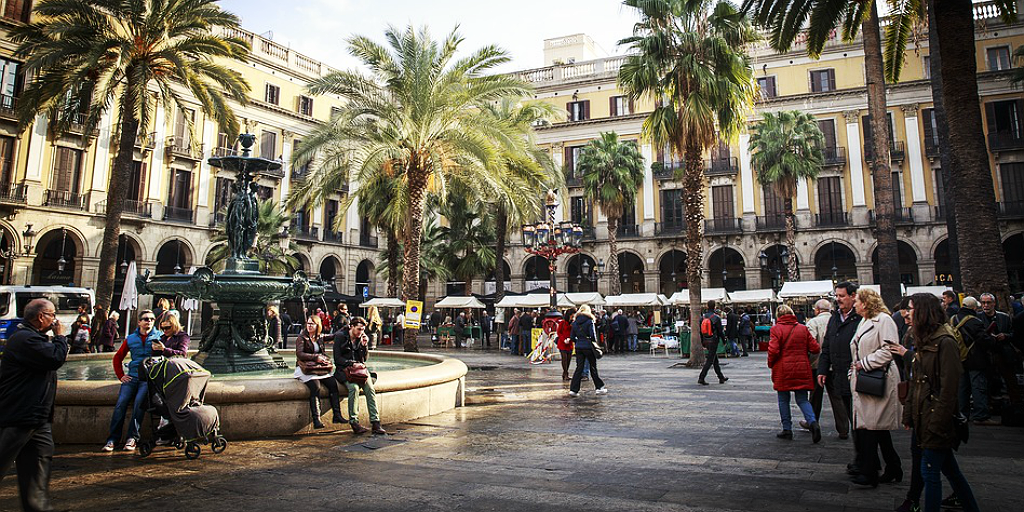
Original image: Barcelona Square by skaramelka is licenced under CC BY-SA 2.0
What is language immersion?
There’s no doubt about it, the most effective way to learn Spanish is to be completely immersed in it. But what does it actually mean to be “immersed” in a language?
When you learn a foreign language it’s a bit like Teaching English as a Foreign Language (TEFL), in that all instructions are given in the language you’re learning.
Scary stuff when you have no idea what’s going on, right?
But complete language immersion doesn’t only refer to what you learn while in the classroom. It’s talking about immersion in every aspect of your life.
I won’t sugar coat it. This is a scary concept at first, but it’s the best way to learn Spanish and pick up on the quirky mother-tongue colloquialisms you would otherwise miss in a classroom.
When speaking Spanish in Spain (well, trying to at least) you have context to enhance your learning. You can see what is being said, which leads to a better understanding than only seeing it written on a piece of paper.
How to speak fluent Spanish…in a week?
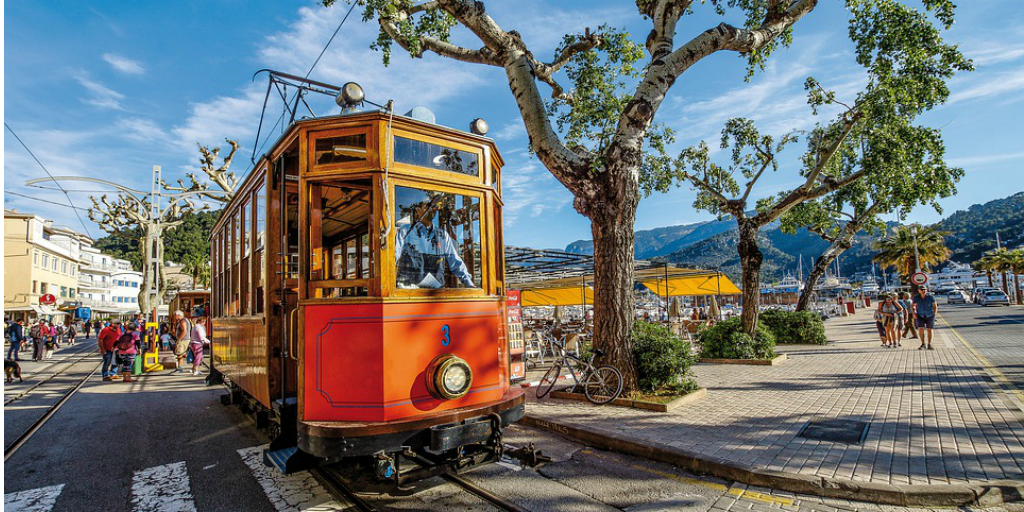
Original image: Spain by franky1st is licenced under CC BY-SA 2.0
A week in, after countless Google searches on how to speak fluent Spanish in a week, I finally accepted that this was probably not going to happen and gained the confidence to leave the house.
Well, not alone, of course.
It still counts, okay.
I walked to the shops, followed closely by my five-year-old translator who often got too distracted in the chocolate aisle to help me with the important things. Like how much these groceries would cost because I really wasn’t sure what the teller meant when she said, “dieciocho euros por favor,” and extended her hand towards me, waiting.
After weekly trips to ice-cream shops and eavesdropping on conversations during my morning tram commute, I slowly started to pick up on common Spanish phrases and what they meant.
Step one of speaking in Spanish: understanding
Understanding is a lot easier than speaking. I learned this pretty early on during my time in Spain.
Friends of my host family would make humorous remarks in Spanish over a plate of steaming paella that would make me laugh, causing the eyes around the table to look at me, waiting for a response.

Original image: Paella by temperateness is licenced under CC BY-SA 2.0
Even though I had understood the joke, and found it funny, I wasn’t yet confident in my ability to try to verbalise a response of my own in Spanish. Which, as you can probably imagine, often led to awkward encounters.
My first day at Spanish school was no better.
Surrounded by “Spanish newbies” and I still felt like the only person on the outside who didn’t understand a thing.
The other eight beginner students in my class were all Italian, and spoke a language with lots of similarities to Spanish, so as you can imagine they picked up on things quite a lot quicker than I did.
My Spanish teachers and fellow classmates soon got used to my blank stares and rosy cheeks in response to any questions directed at me for the first few classes.
Determined to get a hold on the language, I persisted, and after a few weeks found myself willingly attempting to hold basic conversations in Spanish with classmates and local shop vendors.
A glass of vino and away we go
Nights out in sweaty Spanish streets proved to be the best classroom for me. As the hours passed, the seeds I had planted in class finally started to grow.
The narrow street bars in the old town of Alicante came alive at night. They invited local people and study abroad students to mingle, which often resulted in an informal language exchange between the two groups.
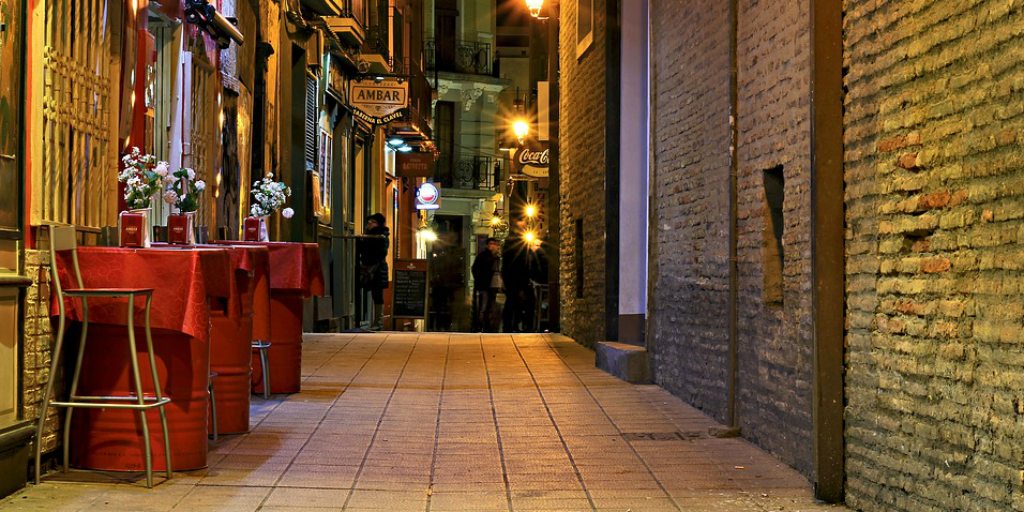
Original image: Bar by Daniel_Nebreda is licenced under CC BY-SA 2.0
Something about a Spanish local trying to communicate in English for my understanding really pushed me to at least try to speak in Spanish, no matter how broken and grammatically incorrect it was.
Slowly but surely, this confidence extended to talking to passersby on the street or abuelas (grannies) on the tram. I started to feel more comfortable with the mistakes I knowingly made, because at least I was trying.
And trying to speak in a language that isn’t your own goes a long way with local Spanish people. It demonstrates respect and a willingness to learn.
Teaching english, learning patience
In an attempt to make my Euros go further, I started teaching English to a friend of my host family. And then two young children, followed by a third lesson to an older child a few months later.
Rather than being a linear teaching experience, I found myself learning nearly as much as I taught.
You see, I had an unlimited amount of patience for these students, as I knew English wasn’t their first language.
It was during a lesson with the two younger children, Sofia and Marcos, that this first dawned on me. Earlier that day, I had a near breakdown after a long and seemingly pointless Spanish class. We sat a short test to establish whether or not we could progress to level A2.3.
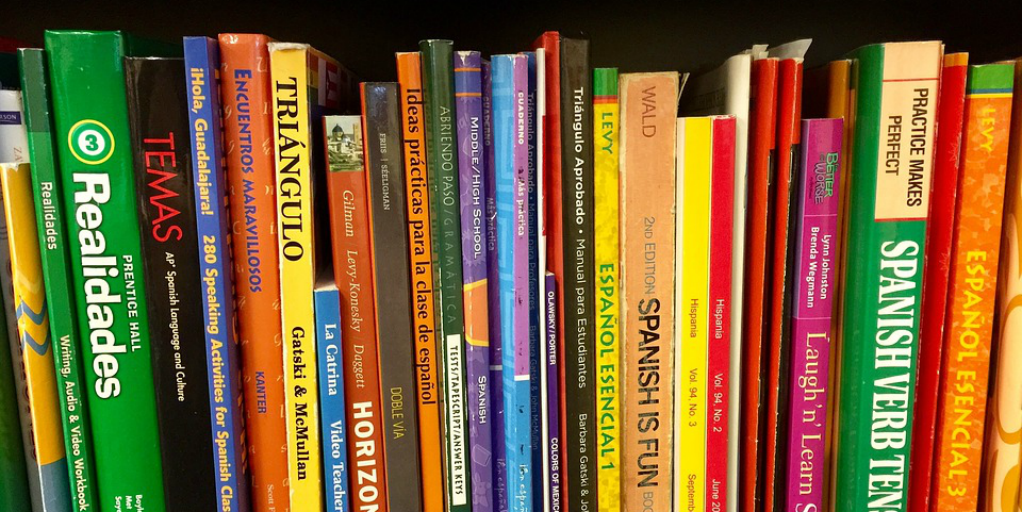
Original image: Books by annekarakash is licenced under CC BY-SA 2.0
I failed. Which meant I had to study the same stuff I had already learned, for another three weeks.
I was frustrated and confused.
Why was I the one person who couldn’t pick up on a second language?
What is wrong with me?
I shoved my Spanish textbook into my backpack and made my way to the tram. I knew Julia would cheer me up once I picked her up from school. She always did.
Later that day I set off down the road to teach Sofia and Marcos. They lived in the same area as us, which was super convenient.
We were learning to name the parts of the body. I watched as Marcos became frustrated with himself over the word “elbow” – his forehead pulled taut with frustration. No matter how many times we labelled it, the English word just wouldn’t stick with him.
Sympathy, understanding and patience washed over me, as I assured him. All things that I later learned I needed to have more of with myself while learning Spanish.
Practise didn’t make perfect, and that’s okay
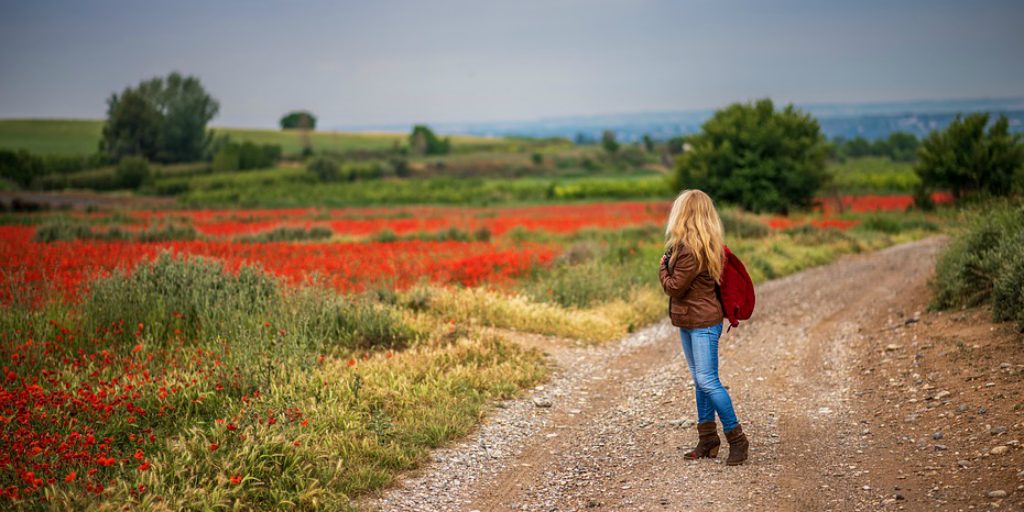
Original image: Path by josealbafotos is licenced under CC BY-SA 2.0
Yes, I noticed improvements, but I was nine months in and a long way from perfect. Starting off in Spain, my expectations were high. I made massive claims about how I would return to South Africa proficient in Spanish and ready to whip out my new language whenever I could.
Well, this didn’t become my reality, and I wouldn’t categorise myself as an intermediate Spanish-speaker (yet). But I’m miles from where I started, and can easily put together words to get my point across and understood.
Learning Spanish taught me a lot more than just another language.
It taught me about a different culture, understanding, patience and respect. It taught me to be easy on myself and non-judgemental.
Y ahora hablo mucho mas de espanol, pero no perfectamente. (And now I speak a lot more Spanish, but not perfectly)
Have a look at our volunteer programs that offer language immersion, plan your future trip, and learn so much more than just a language.
Megan Colborne is a junior content writer for GVI, and an alum of the GVI Writing Academy. The Writing Academy is a skills-development program that pairs development editors with budding travel writers. Learn more about the program here.
By Megan Colborne

